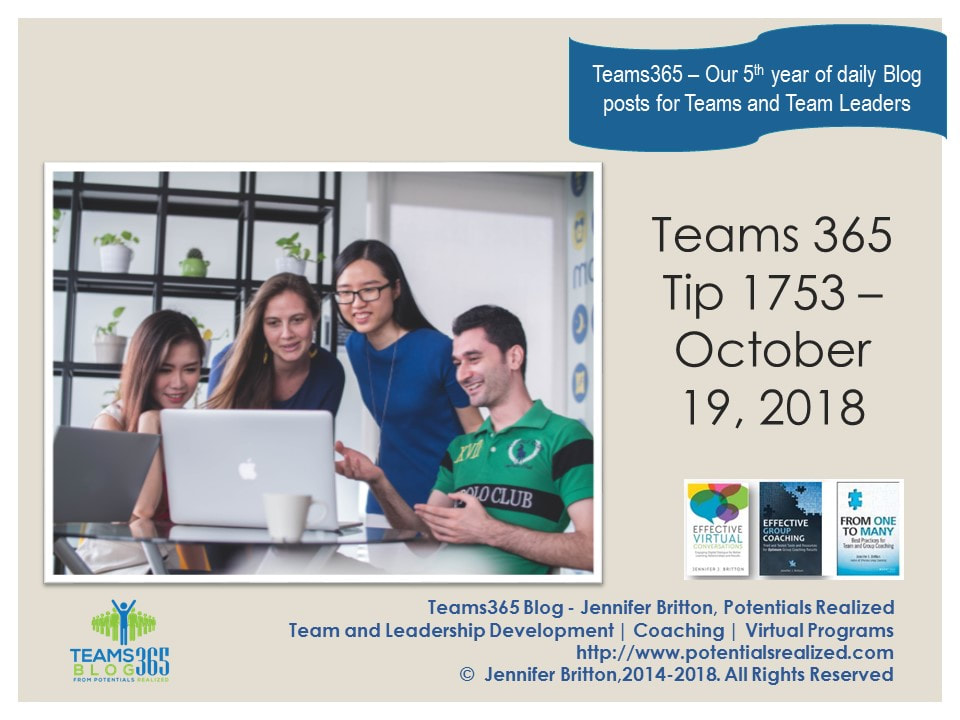Let us take a look back at two posts I’ve written – one on Listening, and one on Working Across Differences.
First, here’s what I wrote in Teams365 #1103 on Listening. Read it here or below.
“Exceptional teams don't usually emerge as exceptional. They develop over time skills in different areas.
The first area we are going to look at is Listening. In a team context listening is of utmost importance - it's listening on multiple levels. Listening to what the other team member is saying, and also listening for how it connects with your work. Listening is also hearing the emotional and requests behind the words. When teams are in conflict, there is usually a request behind each complaint that exists.
In listening we want to listen on multiple levels:
1. To the words that are being shared. This in fact only comprises about 8% of the message.
2. To the tone, pace and pitch of the statement - what do you notice about the energy and impact of how the words are being spoken? This comprises more than 30% of the message.
3. To the body language. What do you notice about the person's gestures? How they are standing? What does their body language say about how open or closed they are? Body language comprises about 55% of the message when we are in face to face settings.
One of the challenges with team communication today is that so much is done by instant messaging or text in which we have no tone or body language to help make sense of what the words really mean. The impact of this means that words and the way they are interpreted are heavily influenced by the levels of trust and connection that exist within the team. You may be interested in checking out these two posts for boosting trust and connection in your virtual teams:
Teams365 #258: Create Connection within Your Virtual Team. Read it here.
Teams365 #610: Four Ways to Build trust in your team.
There are some past posts I've written on listening, which is also a paramount skill in coaching. Take a look at these past posts related to listening:
Teams365 #914: The Foundations of TeamWork - Listening - Read it here
Teams365 #192: Listening And Coaching as A Leader. Read it here”
Working across differences is another challenging area for many teams today. The differences which exist on a team are often the greatest strength. However, how do we become more effective at working across differences? Consider what I wrote in this post – Teams365 #1110 – Working Across Differences.
“Today's teamwork skill in focus is the ability to work across differences. In today's world of ongoing collaboration and teamwork, this skill set is essential.
Some tips for working across differences include:
* Knowing each member's unique strengths and what they bring to the table. StrengthsFinder 2.0 is a wonderful tool to help people understand more about their unique strengths. Click here to read what I have written in the past about the benefits of leading from strengths, and supporting the team in understanding their strengths.
* Creating an environment where differences are celebrated and encouraged
* Understanding the different styles which exist on a team. I usually use the Everything DiSC with the clients I work with. This helps to provide insights around people's natural working style, to support individuals in learning more about their "go to" approaches, especially when under stress. Understanding this also helps to adapt their style for working with others.
What other ways do you want to support individuals on the team in working across differences?”
As you step into the weekend, what’s one concrete thing you can do to support your team in enhancing their skills in either listening or working across differences this month?
Best,
Jennifer
Potentials Realized | Effective Virtual Conversations | Coaching Team Leaders
We provide team and leadership development support through coaching, consulting and training services
Author of several books including the 2018 Coaching Business Builder Workbook and Planner & Effective Virtual Conversations (2017)
Email: [email protected]
(416)996-8326

 RSS Feed
RSS Feed





